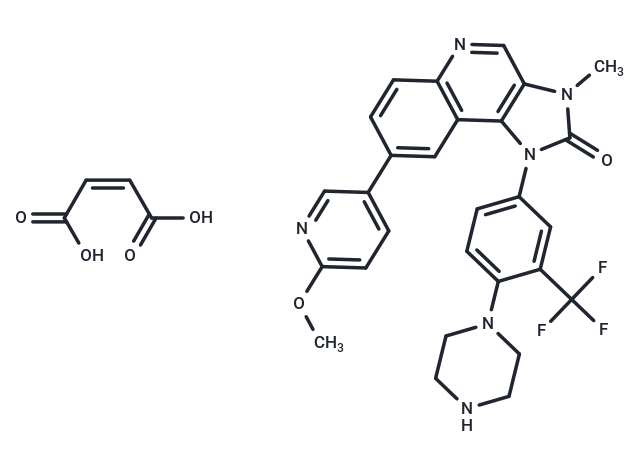Shopping Cart
- Remove All
 Your shopping cart is currently empty
Your shopping cart is currently empty

BGT226 maleate (NVP-BGT226) is a class I PI3K/mTOR inhibitor for PI3Kα/β/γ (IC50: 4/63/38 nM) .

| Pack Size | Price | Availability | Quantity |
|---|---|---|---|
| 1 mg | $32 | In Stock | |
| 5 mg | $70 | In Stock | |
| 10 mg | $116 | In Stock | |
| 25 mg | $256 | In Stock | |
| 50 mg | $377 | In Stock | |
| 100 mg | $539 | In Stock | |
| 200 mg | $738 | In Stock | |
| 1 mL x 10 mM (in DMSO) | $101 | In Stock |
| Description | BGT226 maleate (NVP-BGT226) is a class I PI3K/mTOR inhibitor for PI3Kα/β/γ (IC50: 4/63/38 nM) . |
| Targets&IC50 | PI3Kγ:38 nM, PI3Kα:4 nM, PI3Kβ:63 nM |
| In vitro | The anti-proliferative and pro-apoptotic effects of NVP-BGT226 are independent of bcr-abl status. The activation of the AKT/mTOR signal cascade is suppressed by NVP-BGT226 in a concentration- and time-dependent manner. Flow cytometric analysis exhibits an accumulation of cells in the G(0)-G(1) phase with concomitant loss in the S-phase. NVP-BGT226 displays potent growth-inhibitory activity against all tested cell lines including SCC4, TU183 and KB cell lines with the IC50 ranging from 7.4 to 30.1 nM. Notably, both Detroit 562 and HONE-1 cells, which express PIK3CA mutation H1047R, are still sensitive to the growth-inhibitory effect of NVP-BGT226 treatment. In addition, the sensitivity to NVP-BGT226 between HONE-1 cells and its cisplatin-resistant variant is almost identical. Results of the terminal deoxynucleotidyl transferase-mediated dUTP nick end labeling (TUNEL) assay and the analysis of caspase 3/7 and PARP indicates that NVP-BGT226 induces cancer cell death through an apoptosis-independent pathway. NVP-BGT226 induces autophagy as indicated by the aggregation and upregulation of the microtubule-associated protein light chain 3B-II, and p62 degradation. Gene silencing of Beclin1 or cotreatment of the autophagosome inhibitor, 3-methyladenine, inhibits the NVP-BGT226-induced autophagy and leads to the retrieval of colony survival.[2] NVP-BGT226 inhibits growth in common myeloma cell lines and primary myeloma cells (such as NCI-H929, U266, RPMI-8226 and OPM2 MM cell lines) at nanomolar concentrations in a time-dependent and dose-dependent manner. NVP-BGT226 inhibits phosphorylation of protein kinase B (Akt), P70S6k and 4E-BP-1 in a time-dependent and dose-dependent manner. |
| In vivo | In a xenografted animal model, NVP-BGT226 significantly delays tumor growth in a dose-dependent manner, along with suppressed cytoplasmic expression of p-p70 S6 kinase and the presence of autophagosome formation. NVP-BGT226 inhibits tumor growth in a dose-dependent manner in a FaDu cell xenografted mouse model. Oral administration of NVP-BGT226 at 2.5 and 5 mg/kg for 3 weeks causes 34.7% and 76.1% reduction of the tumor growth on day 21, respectively (compared with control). NVP-BGT226 displays comparable inhibition against tumor growth to rapamycin. The final volume of both groups is significantly smaller than those treated with LY294002 (a PI3K inhibitor) or the control. [2] |
| Cell Research | NCI-H929, U266, RPMI-8226 and OPM2 MM cells are seeded in 96-well plates at a concentration of 1.5 × 104 cells/well in RPMI medium supplemented with 10% fetal bovine serum with or without NVP-BGT226 that is to be tested. After 36 hours, BrdU-labelling solution is added (final concentration: 10 μM), and cells are cultured for another 12 hours in a humidified atmosphere (37 °C/5% CO2). Then, the plates are centrifuged (10 min, 300 g), and the supernatants are discarded. The plates are dried at 60 °C for 2 hours. After fixation with ethanol/HCl for 30 min at -20 °C, the DNA is partially digested by nuclease treatment for 30 min at 37 °C. The cells are washed three times with medium and incubated with anti-BrdU-POD labelling solution for 30 min at 37 °C. The anti-POD solution is removed and the cells are washed three times with washing buffer. The ABTS substrate solution is added, and absorbance is measured in a microplate reader at 405 nm with a reference wave length of 490 nm.(Only for Reference) |
| Alias | NVP-BGT226 (maleate), NVP-BGT226, BGT226 |
| Molecular Weight | 650.6 |
| Formula | C28H25F3N6O2·C4H4O4 |
| Cas No. | 1245537-68-1 |
| Smiles | OC(=O)\C=C/C(O)=O.COc1ccc(cn1)-c1ccc2ncc3n(C)c(=O)n(-c4ccc(N5CCNCC5)c(c4)C(F)(F)F)c3c2c1 |
| Relative Density. | no data available |
| Storage | Powder: -20°C for 3 years | In solvent: -80°C for 1 year | Shipping with blue ice. | ||||||||||||||||||||||||||||||
| Solubility Information | Ethanol: < 1 mg/mL (insoluble or slightly soluble) DMSO: 60 mg/mL (92.22 mM), Sonication is recommended. H2O: < 1 mg/mL (insoluble or slightly soluble) | ||||||||||||||||||||||||||||||
Solution Preparation Table | |||||||||||||||||||||||||||||||
DMSO
| |||||||||||||||||||||||||||||||

Copyright © 2015-2025 TargetMol Chemicals Inc. All Rights Reserved.